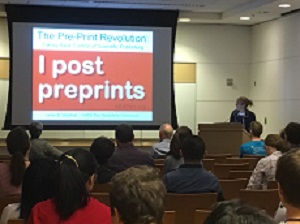This post was written by our Guest Blogger, Zheng Ser, PhD Student, Kentsis Lab, Tri-Institutional Program in Chemical Biology.
 What are preprints and how can they benefit scientists?
What are preprints and how can they benefit scientists?
To answer these questions, Dr. Leslie B. Vosshall (@pollyp1) and Dr. John Inglis (@JohnRInglis) shared their experiences and knowledge to an audience of scientists and other curious attendees from the New York City area. The event was jointly organized by eLife ambassadors (Michiel Boekhout, Lilian Lamech, Zheng Ser) and Memorial Sloan Kettering’s Library Director (Donna Gibson) as part of the Advancing Authorship: Library Series.
With the proliferation of digital computers and the internet, information has become more freely available and more readily available than ever before. Yet, the time taken for scientists to publish their work in scientific journals has only increased in the past few decades. The journal submission process and lengthy peer-review has contributed to the increased time it takes to publish research results and disseminate findings to the scientific community.
One solution is preprints. Dr. Leslie Vosshall, a Professor at The Rockefeller University and an ASAPBio Ambassador, spoke about preprints and how they can help accelerate the dissemination of scientific work by allowing public access to manuscripts before or during the peer-review process. This transparency is a great way for scientists to comment, as well as receive timely feedback on their work. Dr. Vosshall shared her own experience with posting preprints and how the scientific community has responded to using preprints to further discuss scholarly research. She offered a few cases where the speed of transparency afforded by posting preprints has resulted in a quicker response to correcting bad or erroneous science, thus allaying fears that the absence of a formal peer-review process will result in the accumulation of bad science on preprint servers. In addition, scientific publishers and funding agencies have shown support for and encourage the use of preprints.
As more scientists continue to post/use preprints, the work to host these preprints will also increase. Dr. John Inglis, co-founder of the biological sciences preprint server bioRxiv and the soon-to-launch health sciences preprint server medRxiv, advocates the adoption of this publication format as a means to help accelerate scientific advancement. Dr. Inglis shared how he took inspiration from arXiv, the preprint server for physical and mathematical sciences to provide a similar service for scientists working on biology and medicine. Dr. Inglis also talked about the nitty-gritty details of running bioRxiv, the need for funding to host and run the server, and future plans to leverage technology to better integrate preprints into the scientific publishing workflow. He shared his concerns about irresponsible science and the kinds of precautions by bioRxiv to disseminate preprints. He showed us metrics revealing how bioRxiv continues to grow and receive more manuscripts submissions.
After the presentations, a lively Q & A took place with Dr. Vosshall, Dr. Inglis, and the audience. Questions included the (ab)use of preprints, research claims in the scientific environment, and how to moderate and filter poor preprint submissions. The event ended with the presenters asking the final question – “How many of you are now willing to consider posting a pre-print?” This answer will certainly unfold over time – if it hasn’t already!
Access the presentation slides to learn more about the benefits of preprints:
- Dr. Leslie Vosshall: “The Pre-Print Revolution: Taking Back Control of Scientific Publishing, I post preprints”
- Dr. John Inglis: “PREPRINTS IN BIOLOGY AND MEDICINE, Communication at the speed of science“